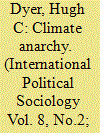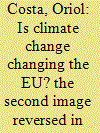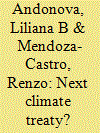|
|
|
Sort Order |
|
|
|
Items / Page
|
|
|
|
|
|
|
| Srl | Item |
| 1 |
ID:
132386


|
|
|
|
|
| Publication |
2014.
|
| Summary/Abstract |
"Climate anarchy" describes the divergence of climate politics from established mechanisms of global governance and an emergent political order. This new (dis)order represents alternative governances and politics, and a challenge to national governmental perspectives on world politics. When interstate policymaking, such as that on climate change, falters at the point of agreement-as it has from Copenhagen in 2009 to Rio+20, and on to Warsaw in 2013-different global relationships are engendered. This occurs as the narrowly defined anarchy of national jurisdictions is superseded by a wider anarchic diversity in political practices. If states must respond to climate change, they are not leading climate policy effectively, and state-centric perspectives cannot account for such political disorder. The ensuing discomfort about the fragmentation of climate governance should be embraced as an opportunity for political innovation, and the diverse responses to climate change viewed as an emerging paradigmatic shift in world politics. The argument thus informs broader debates on policy and governance, as well as conceptual and disciplinary developments, by testing the construction, governance, and anarchy of climate issues.
|
|
|
|
|
|
|
|
|
|
|
|
|
|
|
|
| 2 |
ID:
085406


|
|
|
|
|
| Publication |
2008.
|
| Summary/Abstract |
This article investigates how transnational NGO cooperation can influence the official Chinese stance on climate change politics. Drawing on the constructivist approach to international relations, the so-called 'spiral model', developed by Risse et al (1999) for the human rights field, is applied to environmental politics for the first time. The model is tested by process tracing the historical development of the Chinese position on climate change and by analysing the roles and impacts of different actors in different phases of norm internalization. The model is complemented by an in-depth analysis of present transnational NGO campaigns in China. Although results show that international and Chinese NGOs have an influence on Chinese climate politics, the model's assumption about the causes for a norm internalization could only partly be confirmed: instead of the pressurizing strategies of the transnational advocacy network, instruments of sharing information seem to be more effective in changing Chinese climate politics.
|
|
|
|
|
|
|
|
|
|
|
|
|
|
|
|
| 3 |
ID:
149929


|
|
|
|
|
| Summary/Abstract |
One of the main ways that continued use of coal is justified, and compensated for, is through fantasies of technology. This paper explores the politics of 'Carbon Capture and Storage' (CCS) technologies in Australia. These technologies involve capturing CO2 emissions, usually to store them 'safely' underground in a process called 'geo-sequestration'. In Australia the idea of 'clean coal' has been heavily promoted, and is a major part of CO2 emissions reduction plans, despite the technological difficulties, the lack of large scale working prototypes, the lack of coal company investment in such research, and the current difficulties in detecting leaks. This paper investigates the ways that the politics of 'clean coal' have functioned as psycho-social defence mechanisms, to prolong coal usage, assuage political discomfort and anxiety, and increase the systemic disturbance produced by coal power.
|
|
|
|
|
|
|
|
|
|
|
|
|
|
|
|
| 4 |
ID:
085409


|
|
|
|
|
| Publication |
2008.
|
| Summary/Abstract |
The participation of the European Union (EU) in the international negotiations on climate change has attracted a significant share of scholarly attention. Climate change has certainly become a new dimension of European foreign policy and has enabled the EU to play a leadership role in the international arena. However, the relationship between the EU and the international climate regime is not a one-way street-while the EU has been active and decisive in shaping international negotiations, the latter have also had an impact on the EU. The international negotiations have influenced the EU's decision-making processes and internal negotiations-which has in turn influenced European integration itself. This article builds on the arguments of second image reversed analyses and proposes that there is a reciprocal relation between certain conditions of the EU-domestic setting and the international climate regime. The internal arrangements of the EU regarding climate change have maximized the influence of the regime and the very existence of the international negotiations has moulded these arrangements, making them more prone to external influence.
|
|
|
|
|
|
|
|
|
|
|
|
|
|
|
|
| 5 |
ID:
137267


|
|
|
|
|
| Summary/Abstract |
The United States and China recently announced a joint climate agreement that creates unprecedented political momentum for the Paris COP21 to be held in December 2015. Yet, it is unclear whether such a deal is an historic breakthrough or business as usual policy. A closer look at the US-China climate agreement shows that the chances that the agreed measures have of limiting global warming to 2°C are very few. If seen in terms of concrete policy action, the US pledge comes closer to a pathway compatible with a 2°C target. By contrast, however, China’s pledges are far from consistent with a 2°C pathway. As the COP21 approaches, it is becoming clear that China matters more than ever for an effective climate deal. But it is also becoming increasingly clear that, in the best case scenario, Beijing will support a start now/sprint later agreement in Paris.
|
|
|
|
|
|
|
|
|
|
|
|
|
|
|
|
| 6 |
ID:
137156


|
|
|
|
|
| Summary/Abstract |
The Alliance of Small Island States (AOSIS) encompasses more than 40 low-lying and island developing states that are among the most vulnerable but also most vocal parties in international climate negotiations. Over the years AOSIS's strategies comprised of the building of scientific expertise, and leadership by example, but also a particular framing that puts emphasis on multilateral processes to deal with issues of common concern and established principles of the international community. The initial assumption of the paper is that a frame alignment of climate change and human rights concerns would strengthen the coalition's moral and legal arguments. However, as a frame analysis of close to 50 coalition submissions and statements reveals, such a linkage is not established. The paper concludes by outlining three possible explanatory factors for this observation: the nature of the issue area, the character of the coalition and the professional background of AOSIS negotiators.
|
|
|
|
|
|
|
|
|
|
|
|
|
|
|
|
| 7 |
ID:
084676


|
|
|
|
|
| Publication |
2008.
|
| Summary/Abstract |
Scholars and policy pundits have advanced more than thirteen different designs of a climate change treaty to succeed the Kyoto Protocol. Each of these designs claims to correct the defects of the current agreement. But what kind of a treaty is likely to pass the test of international and domestic politics and negotiations? Can we learn something about the hurdles and opportunities for climate cooperation from negotiations simulations in the classroom? The paper engages these questions by analyzing an experimental course design organized around simulated negotiations of the next climate change treaty. Unlike classroom simulations which rely on hypothetical scenarios, this course sought to approximate actual domestic and international constraints within which countries negotiate. The paper details the structure of the course, the ways in which it familiarizes students with domestic and international climate politics, and the components of the negotiations module. The analysis examines the pedagogical impact and policy learning associated with the simulation and draws conclusions about the broader applicability of this approach.
|
|
|
|
|
|
|
|
|
|
|
|
|
|
|
|
|
|
|
|
|